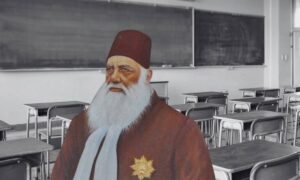One of the giants of Indian literature, Sarat Chandra Chattopadhyay, was born on 15 September 1876. His novels and short stories defined Indian tradition and culture, and his immense popularity made him a household name for more than a century. Even today, the writer who penned classics such as Devdas, Parineeta, Charitraheen, Srikanta, and many more unforgettable stories continues to grip the public’s imagination and influence filmmakers.
He wrote in Bengali, but his works were translated into several other Indian languages and gained nationwide popularity. On numerous occasions, his stories have been made and remade into films in different languages.
Films based on his novels
Devdas and Parineeta became famous and are well known even today. His romantic drama Datta was adapted into a Bengali film in 1951, and the 1961 Telugu film Vagdanam was loosely based on the novel. The Hindi film Apne Paraye (1980), produced by Muneer Alam and directed by Basu Chatterjee, starring Amol Palekar, was based on Sarat Chandra’s novel Nishkriti. The Telugu film Thodi Kodallu (1957) was also based on this novel.

In 1957, Bari Didi was based on the novel with the same name. Two more films on the novel followed. In 1961, Batasari was made in Telugu and Tamil as Kaanal Neer. Hindi films Manjhli Didi, Choti Bahu, and Gulzar’s Khushboo are all adaptations of Sarat Chandra’s stories.
Long-lasting effect on society
His works have had deep and lasting cultural, social, and emotional resonance. Sarat Chandra had an extraordinary ability to portray complex human emotions such as love, sacrifice, pain, injustice, and resulting rebellion, with deep sensitivity. His characters often struggled with inner conflicts, societal constraints, or personal tragedies, making them deeply relatable and moving.
For example, in Devdas, he explores the inner turmoil of a man torn between love and social expectations, depicting vulnerability, weakness, and longing in a way that made the character iconic.
Addressing social reform
When it came to social reform, Sarat Chandra was ahead of his time in addressing issues, especially the plight of women, caste discrimination, and oppressive traditions in Indian society. His stories challenged the status quo.
Novels like Charitraheen (Characterless) and Shesh Prashna (The Last Question) critiqued the harsh moral judgments imposed on women. He often gave voice to female characters, something rare and revolutionary for his era.
Common man’s language
What made him universally popular was that he used the common man’s language. Unlike many writers of his time who wrote in a Sanskritized or highbrow Bengali, Saratchandra used simple, lucid, colloquial Bengali, which made his works accessible to the common reader. This helped his stories reach a wider audience and made him immensely popular.


Sarat Chandra had a profound and lasting influence on Indian culture. It was not just in literature, but in social thought, cinema, theatre, education, and everyday values. He encouraged and empowered readers to rethink gender roles and also inspired generations of Indian writers to create more nuanced female characters.
His stories encouraged feminist discourse long before it became mainstream in India. For example, characters like Paro (in Devdas), Lalita (Parineeta), and Rajlakshmi (Srikanta) were not one-dimensional—they were strong, emotionally rich, and deeply human.
Questioned caste divides
His stories questioned orthodox Hindu practices, caste hierarchies, the status of widows, and child marriage. They sparked off conversations and debates about the hypocrisies and cruelties in Indian society. His work aligned with reformist movements like Brahmo Samaj and the Indian Renaissance.
His books popularized reading among the masses. Before Saratchandra, literature in Bengal (and much of India) was often elitist or overly formal. He changed that by using simple, elegant prose. He reshaped the reading culture in India, especially in Bengal.
According to Malayalam poet and lyricist O.N.V. Kurup, Sarat Chandra’s name is cherished as dearly as the names of eminent novelists in Kerala. In Maharashtra, translations of Sarat Chandra’s novels created a stir amongst the readers and writers.
Opinion of a British expert
James Drummond Anderson, who was a member of the Indian Civil Service of British India and a leading authority on several Indian languages, was a great admirer of Sarat Chandra. In an article entitled “A New Bengali Writer” in London’s prestigious Times Literary Supplement, dated 11 July 1918, Anderson wrote: “Sarat Chandra’s knowledge of the ways and speech of women and children, coupled with his power of transferring these vividly to the printed page, are rare in any country but more so in India. Sarat Chandra is an admirable master. His level of expertise has not yet been attained by any other Indian writer.”
Sarat Chandra remains the most translated, most adapted, and most plagiarized author in India. His novels also reached a number of people through the medium of film, and he is still an influential force in Indian cinema and literature.
📰 Crime Today News is proudly sponsored by DRYFRUIT & CO – A Brand by eFabby Global LLC
Design & Developed by Yes Mom Hosting






